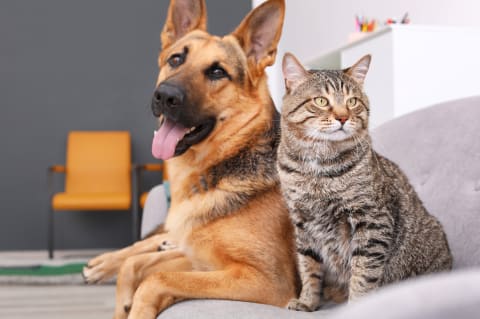Annual fecal exams provide your vet the opportunity to check your dog or cat for intestinal parasites such as roundworms and hookworms. Fecals are the best way to ensure that your pet (and your family) are safe from intestinal parasites.
What is a fecal exam?
Fecal exams are microscopic examinations of your pet's feces. Fecals are used to identify and treat any intestinal parasites that could be compromising your pet's health.
What do fecal exams detect?
Fecals are used to look for intestinal parasites such as hookworms or roundworms. These parasites not only make pets uncomfortable and irritable, they can lead to more serious conditions for your pet, or even be transmitted to humans. Intestinal parasites can thrive in your pet’s gastrointestinal tract, hidden from view. Yearly fecal exams are a simple way to monitor your dog or cat's intestinal health.
How do I prepare for my pet's fecal exam?
Simply collect a fresh stool sample and bring it to your vet's office the same day. The most accurate results are achieved if you bring your pet's stool sample in within 4 to 6 hours of collection. Be sure not to allow the stool sample to dry out or dehydrate as this could mask the presence of parasites.
How often does my pet need a fecal?
Our Asheville vets recommend that all dogs and cats be tested for intestinal parasites at least once a year. Kittens, puppies and pets with gastrointestinal issues may require more frequent fecal exams. Speak to your vet to find out how often you should bring your pet’s stool sample in for testing.
To find out more about parasite prevention for your pet, contact your Asheville vet today.

Looking for a vet in Asheville?
We're always accepting new patients, so contact our veterinary hospital today to book your pet's first appointment.Related Articles View All
Understanding Dog C-Sections - How to Tell if Your Dog Needs One
Many dogs deliver their puppies safely, without the help of a vet, but sometimes problems arise and a C-section is necessary. How can you tell if your dog needs a C-section? How much will your dog's C-section cost? Read on to find out.
Where can I get vaccines for my dog?
"Why does my dog need to get their shots? Can I vaccinate my dog at home? Are there vaccinations that need to be given to my dog at a vet clinic?" Today, our North Asheville vets answer your questions about dog vaccines.
Puppy Vaccination Schedule - When to Get Your Puppy Their Shots
Puppy vaccinations play a vital role in safeguarding your furry friend's health in their first year when they are most vulnerable. Here, our North Asheville vets discuss why puppy vaccinations are essential, and provide a handy puppy vaccination schedule for you to follow.
Osteosarcoma in Dogs - Bone Cancer
Osteosarcoma is an aggressive bone cancer seen in dogs that requires very early detection and treatment in order to achieve good treatment outcomes. Here, our North Asheville vets discuss signs and treatments for this very painful condition.
